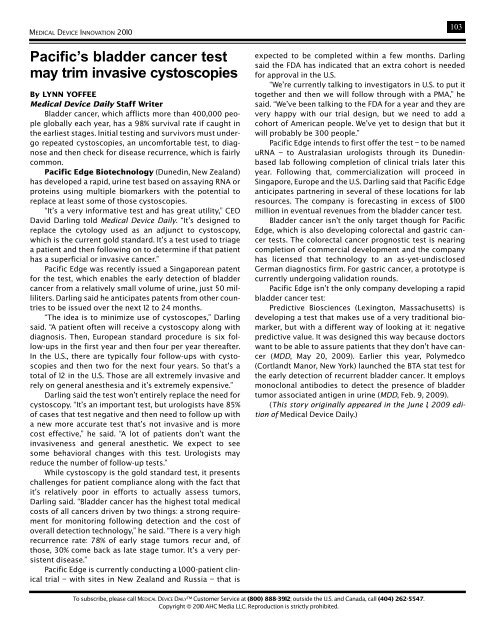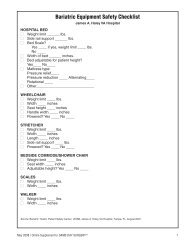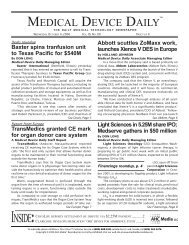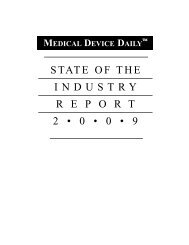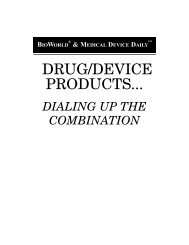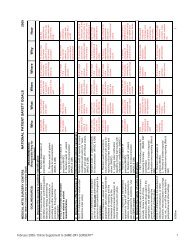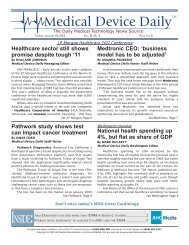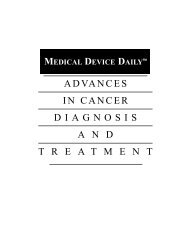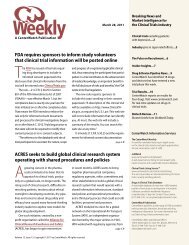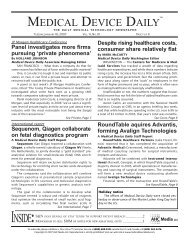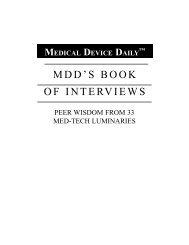MEDICAL DEVICE INNOVATION - Medical Device Daily
MEDICAL DEVICE INNOVATION - Medical Device Daily
MEDICAL DEVICE INNOVATION - Medical Device Daily
You also want an ePaper? Increase the reach of your titles
YUMPU automatically turns print PDFs into web optimized ePapers that Google loves.
<strong>MEDICAL</strong> <strong>DEVICE</strong> <strong>INNOVATION</strong> 2010<br />
Pacific’s bladder cancer test<br />
may trim invasive cystoscopies<br />
By LYNN YOFFEE<br />
<strong>Medical</strong> <strong>Device</strong> <strong>Daily</strong> Staff Writer<br />
Bladder cancer, which afflicts more than 400,000 people<br />
globally each year, has a 98% survival rate if caught in<br />
the earliest stages. Initial testing and survivors must undergo<br />
repeated cystoscopies, an uncomfortable test, to diagnose<br />
and then check for disease recurrence, which is fairly<br />
common.<br />
Pacific Edge Biotechnology (Dunedin, New Zealand)<br />
has developed a rapid, urine test based on assaying RNA or<br />
proteins using multiple biomarkers with the potential to<br />
replace at least some of those cystoscopies.<br />
“It’s a very informative test and has great utility,” CEO<br />
David Darling told <strong>Medical</strong> <strong>Device</strong> <strong>Daily</strong>. “It’s designed to<br />
replace the cytology used as an adjunct to cystoscopy,<br />
which is the current gold standard. It’s a test used to triage<br />
a patient and then following on to determine if that patient<br />
has a superficial or invasive cancer.”<br />
Pacific Edge was recently issued a Singaporean patent<br />
for the test, which enables the early detection of bladder<br />
cancer from a relatively small volume of urine, just 50 milliliters.<br />
Darling said he anticipates patents from other countries<br />
to be issued over the next 12 to 24 months.<br />
“The idea is to minimize use of cystoscopes,” Darling<br />
said. “A patient often will receive a cystoscopy along with<br />
diagnosis. Then, European standard procedure is six follow-ups<br />
in the first year and then four per year thereafter.<br />
In the U.S., there are typically four follow-ups with cystoscopies<br />
and then two for the next four years. So that’s a<br />
total of 12 in the U.S. Those are all extremely invasive and<br />
rely on general anesthesia and it’s extremely expensive.”<br />
Darling said the test won’t entirely replace the need for<br />
cystoscopy. “It’s an important test, but urologists have 85%<br />
of cases that test negative and then need to follow up with<br />
a new more accurate test that’s not invasive and is more<br />
cost effective,” he said. “A lot of patients don’t want the<br />
invasiveness and general anesthetic. We expect to see<br />
some behavioral changes with this test. Urologists may<br />
reduce the number of follow-up tests.”<br />
While cystoscopy is the gold standard test, it presents<br />
challenges for patient compliance along with the fact that<br />
it’s relatively poor in efforts to actually assess tumors,<br />
Darling said. “Bladder cancer has the highest total medical<br />
costs of all cancers driven by two things: a strong requirement<br />
for monitoring following detection and the cost of<br />
overall detection technology,” he said. “There is a very high<br />
recurrence rate: 78% of early stage tumors recur and, of<br />
those, 30% come back as late stage tumor. It’s a very persistent<br />
disease.”<br />
Pacific Edge is currently conducting a 1,000-patient clinical<br />
trial – with sites in New Zealand and Russia – that is<br />
103<br />
expected to be completed within a few months. Darling<br />
said the FDA has indicated that an extra cohort is needed<br />
for approval in the U.S.<br />
“We’re currently talking to investigators in U.S. to put it<br />
together and then we will follow through with a PMA,” he<br />
said. “We’ve been talking to the FDA for a year and they are<br />
very happy with our trial design, but we need to add a<br />
cohort of American people. We’ve yet to design that but it<br />
will probably be 300 people.”<br />
Pacific Edge intends to first offer the test – to be named<br />
uRNA – to Australasian urologists through its Dunedinbased<br />
lab following completion of clinical trials later this<br />
year. Following that, commercialization will proceed in<br />
Singapore, Europe and the U.S. Darling said that Pacific Edge<br />
anticipates partnering in several of these locations for lab<br />
resources. The company is forecasting in excess of $100<br />
million in eventual revenues from the bladder cancer test.<br />
Bladder cancer isn’t the only target though for Pacific<br />
Edge, which is also developing colorectal and gastric cancer<br />
tests. The colorectal cancer prognostic test is nearing<br />
completion of commercial development and the company<br />
has licensed that technology to an as-yet-undisclosed<br />
German diagnostics firm. For gastric cancer, a prototype is<br />
currently undergoing validation rounds.<br />
Pacific Edge isn’t the only company developing a rapid<br />
bladder cancer test:<br />
Predictive Biosciences (Lexington, Massachusetts) is<br />
developing a test that makes use of a very traditional biomarker,<br />
but with a different way of looking at it: negative<br />
predictive value. It was designed this way because doctors<br />
want to be able to assure patients that they don’t have cancer<br />
(MDD, May 20, 2009). Earlier this year, Polymedco<br />
(Cortlandt Manor, New York) launched the BTA stat test for<br />
the early detection of recurrent bladder cancer. It employs<br />
monoclonal antibodies to detect the presence of bladder<br />
tumor associated antigen in urine (MDD, Feb. 9, 2009).<br />
(This story originally appeared in the June 1, 2009 edition<br />
of <strong>Medical</strong> <strong>Device</strong> <strong>Daily</strong>.)<br />
To subscribe, please call <strong>MEDICAL</strong> <strong>DEVICE</strong> DAILY Customer Service at (800) 888-3912; outside the U.S. and Canada, call (404) 262-5547.<br />
Copyright © 2010 AHC Media LLC. Reproduction is strictly prohibited.


